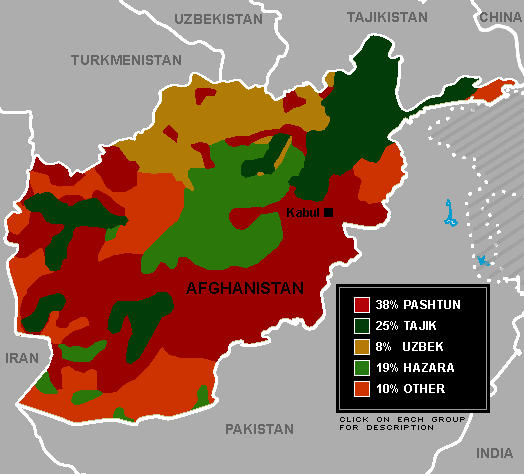WAR IN
AFGHANISTAN

TRIBAL POLITICS & THE ROAD TO VICTORY
Although Western diplomats and scholars often seem to think of Afghanistan as one centralized government, the real power in the country’s vast provinces really belongs to tribal warlords. For starters, Afghanistan is far from an ethnically homogeneous nation, a characteristic that has significantly impacted the war during the last ten years. While the system does result in relative weakness of the central government, Western forces have the option to adopt strategies that take advantage of tribalism to defeat the Taliban, as was the case for the initial invasion of Afghanistan. When considering strategies to help defeat the Taliban, Western commanders would be wise to consider the context of the current war: Due to the widespread chaos and lack of

Since the installment of Hamid Karzai as president of Afghanistan in 2004, central government ineffectiveness is often said to be contingent on the dominance of Tribalism and ethnical loyalties. Coincidentally, however, Tribalism provides rural Afghanistan with its main, if not only, method of organizing societies. Where Karzai’s law does not reach, tribal law, represented by the system of assemblies known as jirgas, prevents Afghan society from falling into chaos. The average Afghan man trusts the Jirga more than he trusts the government. This system evolved mainly from tribal costumes of resolving issues amongst themselves. Moreover, ethnically speaking, Afghanistan is incredibly varied. The country’s 31 million population is formed by groups including the Pashtun, Turkmen, Tajik, Kirghiz, Nuristanis, Hazara, Aimaqs, Uzbeks and Baluch. The diversity often contributes to internal disputes such as the conflict between the Taliban and the Northern Alliance, which lasted from 1996 to 2001. Not surprisingly, Afghans are quick to take sides and form tribal “coalitions”, as was the case during the American invasion. However, despite all the historical evidence, Western commanders underestimate the need to befriend tribal leaders, as they could not only help destroy the Taliban but also contribute to the long term stability of the region by agreeing to side with the government. During the last 50 years, governments, foreign invaders, dictatorships have come and gone, but the tribal system has not changed and nothing indicates it will any soon. We might as well use it while it is available.
 |
|---|
 |
 |
 |
While some might consider the idea of appealing to Afghan’s tribal identities a novelty, it has been around since the 2001 invasion, when American forces were backed up by the Northern Alliance – really a coalition of tribes originally led by Ahmed Shah Massoud. As the goal of the organization was simply to oust the Taliban regime, it was dissolved in 2001 after the American victory. Today, forming alliances with Tribal leaders is more important than ever, considering the Taliban’s strategy of hiding near the border in difficult access regions. Although US Army Special Forces teams have been working on this since before the invasion, it was only in 2009 that the mainstream military adopted this policy of mutual trust with the contribution of social scientists. As of late 2013, however, the US presence in Afghanistan appears to have committed fatal mistakes that severely deteriorated relationships with both the central government and the tribal leaders, most significantly the massacre perpetrated by Staff Sergeant Robert Bales in March 2012 and the burning of Korans in Bagram Airbase in August 2012. While the former incident was admittedly hard to predict, relatively simple measures such as stricter guidance for soldiers and knowledge of Muslim customs would have worked against the latter. If the USA are to maintain military advisors and/or defeat the Taliban in Afghanistan, then this ideological conflict between Tribalism and Democracy, Islam and the Judeo-Christian tradition needs to end so that an alliance to flush the Taliban out of its caves can be born. Although Thomas Carlyle’s theory that history is the result of the actions of great men might not be valid when applied to history as a whole, it certainly accurately reflects the status quo in Afghanistan. The locations where the Taliban is allowed to hide, its use of land and resources as well as weapons smuggling only occur due to the consent of warlords and tribal rulers that are willing to support the extremist faction. Gathering the support of tribal leaders would essentially ensure American control over the whole of Afghanistan’s extensive territory, causing a weak Taliban to be unable to leave hiding and writing history just like Carlyle predicted.
political unity, which has been the norm since before the Soviet Invasion, it is ridiculous to assume that ruling Kabul ensures control over Afghanistan.